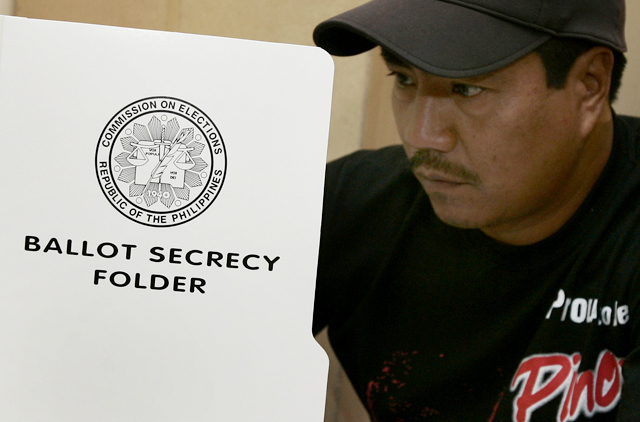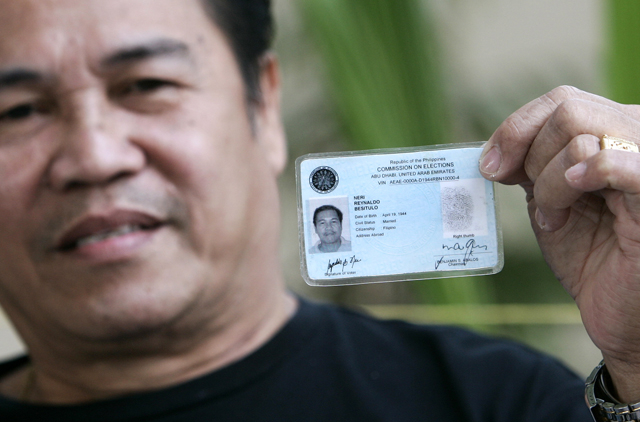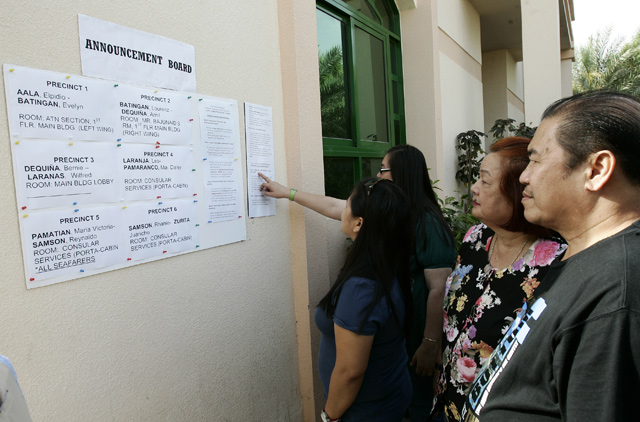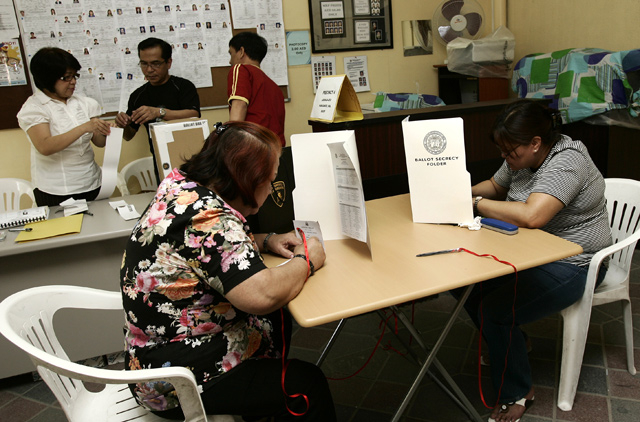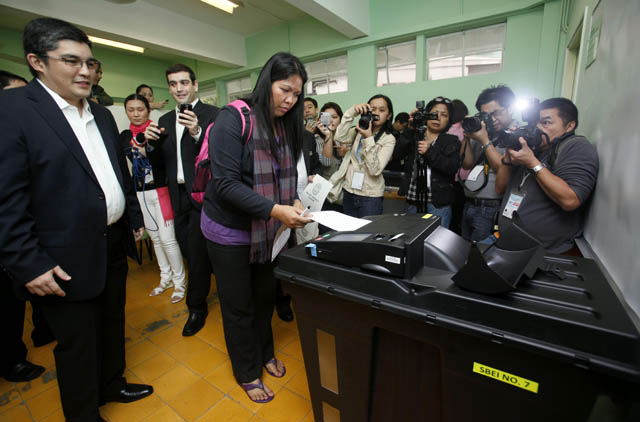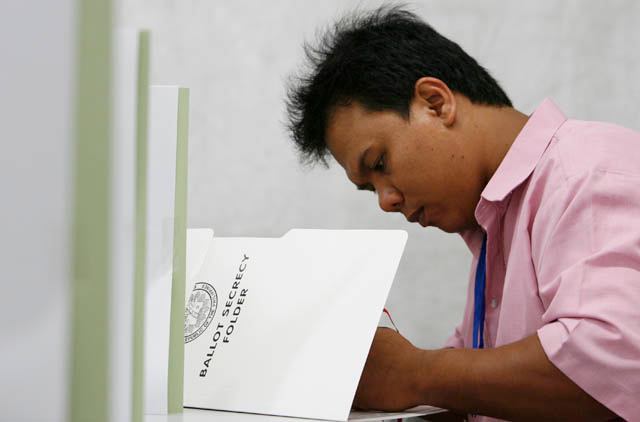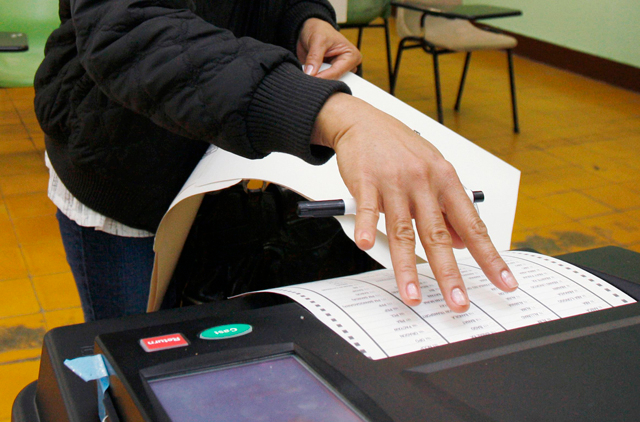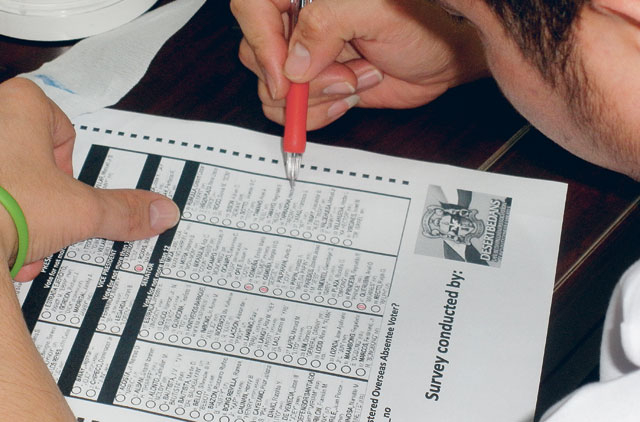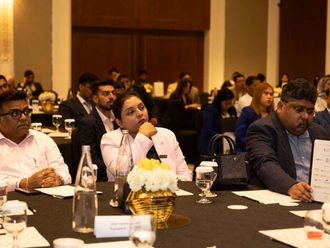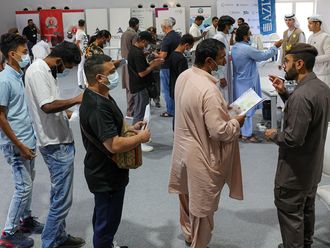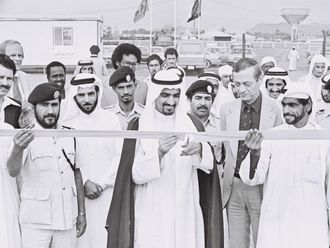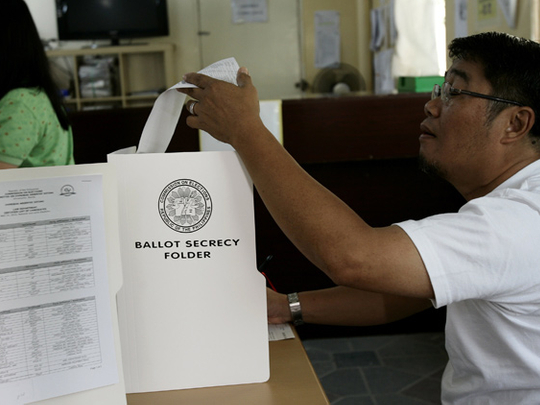
Dubai: Voter turnout at Saturday's start of the month-long absentee voting for the Philippine general elections exceeded expectations, the nation's top diplomat to the UAE told Gulf News on Sunday.
"We were only expecting about 100 voters but 140 of the 17,041 registered voters in Abu Dhabi turned up," said Philippine Ambassador to the UAE Grace Relucio Princesa.
In the Philippine Consulate in Dubai, 104 voters out of the 30,642 were able to cast their votes.
Under the Philippines' Overseas Absentee Voting Act of 2003, Filipinos working or residing overseas who are qualified to vote may elect the president, vice-president, 12 senators and a party-list representative.
Factfile: The Philippine elections
According to Benito Valeriano, Consul-General to Dubai, they expect the turnout to come in trickles in the succeeding days.
"We should understand that these voters attend to their work on weekdays and will not have time to go here," he told Gulf News.
He added they expect bigger numbers during weekends as the polling precincts in the Embassy in Abu Dhabi and the Consulate in Dubai will remain open from 8.30am to 3pm.
Relucio said she wants to retain her record in the absentee voting in terms of voter turnout.
"I want to bring as many voters to come here and vote. During the 2007 elections, I had the highest turnout when I was in Geneva… hopefully, I'll be able to do that here," she said.
Guide: Absentee voting process in Dubai
Fact file: The automated voting process
Special coverage: Philippine elections
At the Embassy, election inspectors and voters were treated to pan de sal (a traditional Philippine bun) and coffee in the morning.
"In the Philippines, election day is like a fiesta (feast) and we want that atmosphere here. We want everybody to have fun and be happy," Relucio said.
The envoy said she wants to challenge Filipino community leaders to influence their compatriots to participate in the voting.
"I'm posing this challenge to them. Let's use text (messaging) power to enjoin our kababayans (compatriots) to vote," she said.
Relucio also apologised to voters – as well as the media – who encountered problems on the first day of the absentee voting.
"I'm really very sorry, but we're continuing our efforts to make the voting smooth and successful. We're trying to learn along the way," she said.
Relucio said she will be calling the Commission on Elections and the Overseas Absentee Voting Secretariat in Manila to seek guidance on the issues they initially encountered such as missing or misplaced names on the certified list of voters as well as the rules and regulations on media coverage.
Consul-General Valeriano, for his part, said they were given verbal instructions to accept and approve applications for media accreditation, but they're still waiting for written orders.
Meantime, he said, they will allow the media to cover the voting "provided they stay outside the polling precinct".
"The media should understand that our polling precincts occupy the space where we process passport applications and other consular services and there's not much space to move around," Valeriano said.
Fact file: Philippine elections
Preparations for the 2001 national elections started as early as April 2008 when the Commission on Elections held consultations with the Philippine Department of Foreign Affairs and the Commission on Filipinos Overseas on how to streamline the voters registration process and ensure a better turnout from an estimated 6.9 million Filipinos based overseas.
The registration period, which was initially planned to start on December 1, 2008, was moved to a February 1, 2009 start. This was done to ensure that the embassies and consulates have enough time to prepare.
The registration period ended on August 31, 2009.
Of the 589,839 registered OAVs worldwide. 47,683 were from the UAE, of which, 17,041 were registered in the Philippine Embassy in Abu Dhabi while 30,642 were listed in the Philippine Consulate in Dubai.
A survey conducted recently by the San Beda College Alumni Association-UAE chapter showed 69.92 per cent of its respondents did not register as OAVs.
Overseas Absentee Voting Act
The Overseas Absentee Voting Act, officially known as the Republic Act number 9189, is a law passed on February 13, 2003 which allows Filipinos — currently residing or working outside of the Philippines — to vote in an election. This act is implemented by the Philippine Commission on Elections (Comelec) with the help of the Department of Foreign Affairs (DFA). Overseas absentee voters (OAVs) may only participate in the election of a President, Vice-President, Senators and Party-List Representatives.
Who are qualified to vote
- Filipino citizens, not otherwise disqualified by law.
- At least 18-years of age as of May 10, 2010.
- Registered as an overseas absentee voter (OAV).
Voting period
OAVs may cast their votes from April 10 to 10 May 2010 from 8.30am to 4.30pm every day, except on the last day (May 10) when voting will be from 8.30am to 2pm to coincide with the closing hour (6pm) in the Philippines.
Modes of voting
- Personal Voting - OAVs whose application to vote in absentia has been approved shall cast their ballots personally at any time within the voting period. This is the mode of voting to be implemented in the Embassy in Abu Dhabi and the Consulate General in Dubai.
- Voting By Mail - Electoral mails are sent by the Commission on Election (Comelec) directly to the OAVs, based on their addresses registered in the Certified List of OAVs database. Voters will receive a packet that contains the ballot and envelopes to seal and send/deliver the ballot. It also contains a certified list of candidates and instructions on how to cast their votes.
- Modified Voting By Mail - Electoral mails are sent by the Comelec directly to the Foreign Service Posts (embassies and consulates) . These in turn will distribute the electoral mails to the OAVs.
Key information
For more information on overseas absentee voting, please visit the Comelec website at www.comelec.gov.ph. Read special coverage of the Philippine elections
Will you be voting? How do you keep track of developments in the Philippines while living in the UAE?


